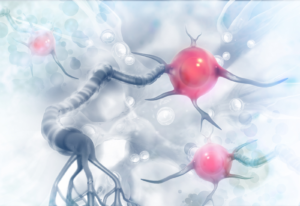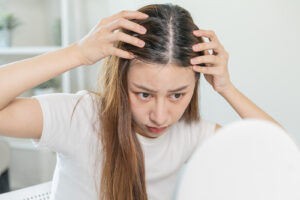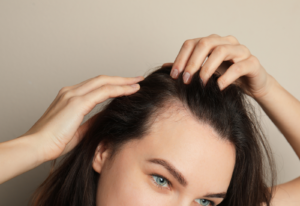Pregnancy and postpartum are beautiful phases in a woman’s life. However, they can also bring about significant changes in the body, including hair loss. Many women experience hair shedding during this time; in fact, 40-50% of women will experience hair loss while pregnant. Similarly, 40-50% will experience postpartum hair loss. Understanding the causes and implementing effective strategies can help manage hair loss during pregnancy and postpartum. Read on to learn more.
Causes of Hair Loss During Pregnancy and Postpartum
Hormonal Changes
During pregnancy, hormonal fluctuations are common, and they can have a profound impact on the hair cycle. Elevated levels of estrogen extend the growth phase of hair, leading to fuller, healthier-looking locks. However, after giving birth, the estrogen levels drop dramatically, causing hair to enter a resting phase. This can result in excessive hair shedding, known as postpartum hair loss.
Nutritional Deficiencies
During pregnancy, it is crucial to provide your body with the necessary nutrients to support both your health and the development of your baby. Insufficient intake of specific vitamins and minerals can have an impact on your hair health, leading to increased hair loss during and after pregnancy. Here are some essential nutrients to focus on:
- Iron: Iron deficiency can contribute to hair loss. Ensure you consume iron-rich foods such as lean meats, poultry, fish, leafy green vegetables, legumes, and fortified cereals. If needed, your healthcare provider may recommend iron supplements.
- Biotin: Biotin, also known as vitamin B7, plays a vital role in hair growth and strength. Include biotin-rich foods like eggs, nuts, seeds, whole grains, and dairy products in your diet. Your doctor might also suggest biotin supplements if necessary.
- Zinc: Zinc deficiency has been associated with hair loss. Incorporate zinc-rich foods such as oysters, lean meats, poultry, legumes, nuts, and whole grains into your meals. If required, your healthcare provider may recommend zinc supplementation.
- Vitamin D: Vitamin D deficiency has been linked to hair loss. Spend time in the sun to allow your body to produce vitamin D naturally. Additionally, consume vitamin D-rich foods like fatty fish (salmon, mackerel), fortified dairy products, and egg yolks. If your levels are low, your doctor may recommend vitamin D supplements.
- Vitamin E: Vitamin E is an antioxidant that helps protect the scalp and promote hair growth. Include foods like nuts, seeds, spinach, broccoli, and avocados in your diet to boost your vitamin E intake.
- Omega-3 Fatty Acids: Omega-3 fatty acids, found in fatty fish (salmon, mackerel, sardines) and flaxseeds, promote scalp health and support hair growth. Consider incorporating these sources into your diet or consult your healthcare provider regarding omega-3 supplements.
Remember, it’s always best to consult with your healthcare provider or a registered dietitian for personalized advice on meeting your nutritional needs during and after pregnancy. They can assess your specific situation and guide you in making the right dietary choices to support hair health and overall well-being.
Physical and Emotional Stress
Pregnancy and the postpartum period can be physically and emotionally taxing. Hormonal changes, sleep deprivation, and the demands of caring for a newborn can significantly increase stress levels. This heightened stress can contribute to a type of hair loss known as telogen effluvium, where a large number of hair follicles enter the resting phase simultaneously, leading to increased hair shedding.
Managing physical and emotional stress during this time is crucial for your overall well-being, including hair health. Prioritizing self-care by allocating time for activities you enjoy and finding moments of relaxation can help alleviate stress. Adequate rest and sleep are essential, so try to enlist the help of your support system to share the responsibilities of caring for the baby.
Tips for Managing Hair Loss During Pregnancy and Postpartum
Maintain a Healthy Diet
Consuming a balanced diet rich in essential nutrients is crucial for hair health. Incorporate foods that are high in vitamins A, C, D, E, and B-complex, as well as minerals like iron, zinc, and biotin. These nutrients promote healthy hair growth and minimize hair loss.
Examples include:
- Vitamin A: carrots, sweet potatoes, spinach, kale
- Vitamin C: citrus fruits, strawberries, bell peppers, broccoli
- B-complex Vitamins: whole grains, eggs, nuts, legumes
- Vitamin D: fatty fish (salmon, mackerel, sardines), fortified dairy products
- Vitamin E: almonds, sunflower seeds, spinach, avocado
- Iron: lean meats, poultry, fish, leafy green vegetables, legumes
- Zinc: oysters, lean meats, poultry, nuts, whole grains
- Biotin: eggs, nuts, seeds, whole grains, dairy products
Gentle Hair Care Routine
During pregnancy and postpartum, it is essential to handle your hair with care. Avoid tight hairstyles that pull on the hair follicles, and minimize the use of heat styling tools. Use gentle, sulfate-free shampoos and conditioners that promote scalp health and nourish the hair.
Stress Management
Finding ways to manage stress is vital for overall well-being, including hair health. Engage in activities that help you relax, such as meditation, deep breathing exercises, or gentle exercises like yoga. Adequate rest and self-care are also essential in reducing stress levels.
Seek Professional Solutions for Hair Loss
At Eldorado Hair Restoration, a trusted provider of hair loss solutions in Baltimore, you can find a range of effective options to address your specific needs. Their experienced team offers personalized consultations and expert advice to help you regain your confidence. Here are some of the solutions they provide:
- Human Hair Extensions: Eldorado offers high-quality human hair extensions in Baltimore that seamlessly blend with your natural hair, adding length and volume. These extensions are available in various shades and textures, allowing for a customized and natural-looking result.
- Hair Systems: If you’re looking for a non-surgical solution, Eldorado offers advanced hair systems. These custom-designed systems are crafted using real human hair and are tailored to match your unique hair color, texture, and density. Hair systems provide a natural appearance and can be styled and cared for just like your own hair.
- Human Hair Wigs: Eldorado provides a selection of human hair wigs that are meticulously crafted to mimic natural hair growth patterns and textures. These wigs are available in different styles, lengths, and colors, giving you the flexibility to achieve your desired look.
In addition to these solutions, Eldorado offers comprehensive hair loss evaluations and treatments, including hair transplant procedures, scalp micropigmentation, and medical therapies. Our team of Baltimore hair loss specialists will guide you through the available options and recommend the most suitable approach based on your unique circumstances.
In Conclusion
Experiencing hair loss during pregnancy and postpartum is a common concern for many women. Understanding the causes and implementing effective strategies can help manage this issue. By maintaining a healthy diet, adopting a gentle hair care routine, managing stress, and seeking professional solutions when needed, you can navigate through this phase with confidence and ensure optimal hair health.
Contact Eldorado for Baltimore Hair Loss Services and Solutions
Whether you’re looking for temporary solutions like extensions or wigs or considering long-term options, Eldorado Hair Restoration has the expertise and resources to help you find the best solution for your individual hair loss concerns. Contact us to schedule a consultation or book a free hair analysis and take the first step toward restoring your hair and confidence.





